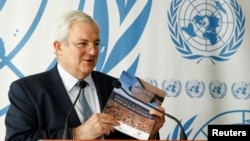The growing need for food, medicine and shelter by millions of people facing conflicts and crises around the world is far outstripping the increased generosity of donors, the United Nations' outgoing humanitarian chief warns.
Stephen O'Brien, who is stepping down August 31 as undersecretary-general for humanitarian affairs and the world body's emergency relief coordinator, said in an interview this week that "we have to get to the root causes to try to reduce needs."
Equally, he said, the United Nations needs to intensify donations, especially from its 193 member states.
The United Nations has appealed for $23.5 billion to help over 102 million people in 38 countries this year but has received only $8.1 billion, according to the U.N. Office for the Coordination of Humanitarian Affairs, or OCHA, which O'Brien heads.
The appeals range from about $10 million for Mozambique, where an earthquake hit in June, to $3.34 billion for conflict-torn Syria.
OCHA said late Wednesday that the appeal for Yemen — the Arab world's poorest country, which is in the throes of civil war and the world's worst cholera epidemic — has increased to $2.3 billion but is only 41 percent funded.
U.N. agencies are currently trying to cope with "level three" emergencies, the highest level, not only in Syria and Yemen but also in Iraq.
During O'Brien's more than two years leading OCHA there was also a "level three" emergency in South Sudan, which still faces a humanitarian crisis as a result of civil war.
O'Brien said the scale of financing required for humanitarian action to meet current and projected needs around the world "requires us to be permanently innovative, welcoming of all contributions."
But speaking practically, he said, this will always require "a major commitment from the maximum number of committed member states" with access to taxpayer funding.
He recalled that a panel on humanitarian financing in early 2016 helped identify "a grand bargain" to improve humanitarian results through greater efficiency, joint action and an end to competition between organizations — and he said he's seen results since then.
O'Brien said there's now "a new way of working" in the field as officials cooperate on humanitarian aid and economic development.
He said the first-ever U.N. humanitarian summit in Istanbul in May 2016 agreed on an agenda that focuses on preventing and reducing conflicts, supporting international humanitarian law, reducing humanitarian needs and ensuring aid for all who need it.
"We must never let up on our determination to advocate for a better world and to find leadership and the leaders to help make that happen," he said.
O'Brien said despite the scale of needs and conflicts "in the most challenging places ... we are nonetheless reaching people all the time."
But he stressed that there are still too many unmet needs, including in Libya.
O'Brien said U.N. staffers face danger on missions in many places, such as Afghanistan, Iraq, Syria, eastern Ukraine or Rakhine state in Myanmar.
Last year alone, 101 aid workers were killed, 98 wounded and 89 kidnapped.
"I see just how much risk is being taken, though we take every measure to protect them," O'Brien said. "But sadly, whether it's in Yemen or Somalia, South Sudan, northeast Nigeria or any countries already mentioned, we are faced with terrible and perilous challenges."
O'Brien will be returning to his home in northern England. His successor, Mark Lowcock, is also from Britain.




